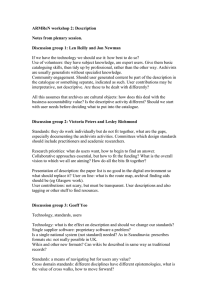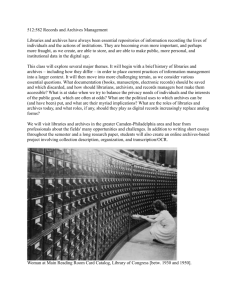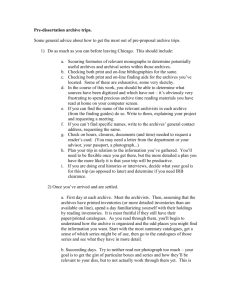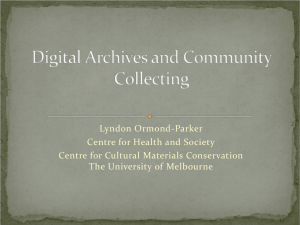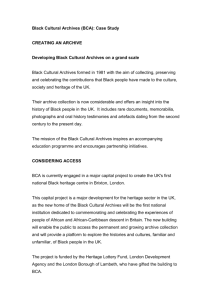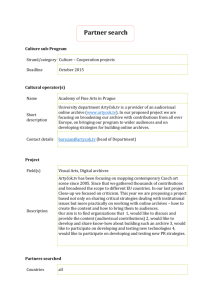Emerging Technologies in Archives
advertisement
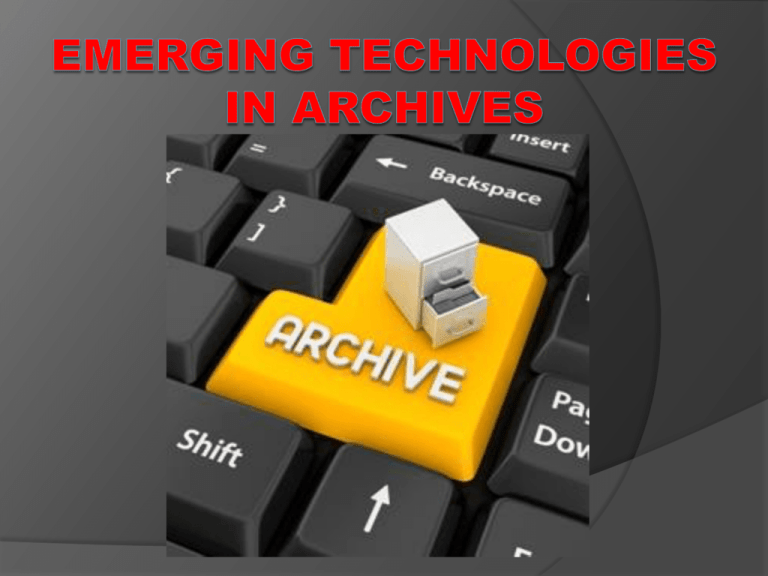
Digital Library Collections Different ways digital collections are stored: - Digital or institutional repositories - Cloud and data grids, servers and hard drives - Dark archives Digital objects are normally stored by format, topic, geography rather than Library of Congress classification number. Maintenance Maintenance of digital archives can become more complicated than their physical copies since digital librarians need to create the best way to describe, store, and provide access to each item so that it can be found again in the digital archive (Gregory & Rudersdorf, 2015). Digital Information Profession The archives in libraries are continuing to have their archivists transfer documents, creating the new library field of digital archivists. This is how digital libraries are coming into place, with interface designs for example, as a way libraries are able to keep their software up to date with the transfer of documents into the digital world. Names for informational professionals with focus on digital library collections: - Digital curators - Digital archivists - Digital stewards - Digital preservationists - Digital librarians With technology being such an enhancing way to maintain archives into the digital world, many fields have been created so that information professionals can assess how to attend to their virtual audience. Circle of Archiving Life Technology is now part of the archiving life, allowing the birth of a new format of information to be shared to more people than ever. The three ages of a virtual archive: 1. From the fact of life 2. The written document 3. Digitized version (Sava & Pop, 2010). Circle-of-life pattern is the composition of the three main ways information is shared thanks to technology, which has become the third way. -All formats of information start with the mind. An idea is the beginning of information. -Once the fact has formed does the handwritten document comes into place. -Then digitization comes into place, which by scanning it, the same information takes on a different form. Preservation of Digital Materials Future historians need digital material to be saved successfully in the present time. Technology comes with its own complications, including the question of whether all digital sources need to be preserved. Interface Design Interface design -Allows complete transition of libraries into the digital world. -A necessary shift that maximizes digital libraries’ potential. -Shares materials that are no longer exclusive solely within the library. -The new way newspapers, for example, have transferred into the online world and away from the traditional print version. (Harkema, 2014) Printed Copies Digitally archiving of original printed forms of documents, such as books and journals, makes the process easier online so long as the printed copy is kept safe within a physical archive. Vice Versa - This process vice versa is difficult because online sources can constantly change due to editing and even go through deletion. - A printed version can be archived, but if the original online version gets changed in any way, this significance of its physical archive is lost. Possible Technical Issues There are two main technical issues at the core of digital Preservation that continues to be a concern in the digital era. - Data loss - Technological obsolescence (Kastellac, 2012) - A concern arrives regarding born-digital data, such as blogs and websites, These online medias are difficult to preserve as the sources can constantly change and be edited. - Keeping a printed copy of them is encouraged, but they are given such “fragile and vulnerable nature,” and they may not likely be not ever been catalogued correctly (Rowland & Bawden, 2012, p. 224). Welcoming Technology Archives would normally keep their “holdings behind walls of copyright,policy, or indifference, rendering them inaccessible to many” (Prelinger, 2007, p. 114). Technology is still being welcomed regardless of its tendency to become problematic and disruptive. Many archives accept that technology is available to help keep documents useful in the future through preservation. Risks in Digital Transfers Archivists are in charge of taking extra care of old papers that can wither away without proper care. Digital transfers of old papers requires extra care in removing old documents from their spot in the archive to be scanned digitally. While technology is now encouraging to transfer paper to computer, archivists have a legitimate reason to be weary of transferring certain documents. - Some books may be held by staples and fasteners on the pages, which would require extreme care when removing if to be scanned. Archive Discretion Librarians have learned to develop different ways to work around this issue of handling old papers in the scanning process while also being aware of the documents that need extra care and to use their own judgment on whether to risk scanning them. - Books may also be held in boxes to prevent any light. These may need a judgment call by the archivists whether they can risk taking them out of the boxes to be put into the scanner. Digital Archiving The traditional form of archiving is becoming outdated with the introduction of a digital archivist field. While saving Hand copies of documents is crucially important in the information world, the ability to share these documents is becoming a way to provide more data and studies for other researchers and information experts to use in their own studies, creating a chain of information use. Collaboration with technology and physical archives Instead of debating between a virtual or physical archive is the best way to store information, many physical archives are using technology to preserve their saved copies held in the archive rooms since digital archives are now becoming a necessity. There is now a “collaboration between archivists and information technology professionals in a university library in order to manage the university’s born-digital archival records” (Lawrimore, 2013, p. 189). Conclusion Physical archives may be considered an outdated way to store information, but they still need to stay alive in the internet world because they are reliable when digital born materials have the risk of system malfunction. Instead of fearing the worse in technology, digital archivists work with discretion to share as many stored information as possible. References Cain, M. (2003). Managing technology: Being a library of record in a digital age. Journal Of Academic Librarianship, 29(6), 405-410. Gregory, L., & Rudersdorf, G. (2015). Digital resources. In S. Hirsh (Ed.), Information Services Today: An introduction. Lanham, Maryland: Rowman & Littlefield. 94-98. Harkema, C. (2014). A site for scholarly primitives: Exploring the digital library interface. International Journal Of Technology, Knowledge & Society: Annual Review, 10(1), 113. Kastellec, M. (2012). Practical limits to the scope of digital preservation. Information Technology & Libraries, 31(2), 63-71. Lawrimore, E. e. (2013). Collaboration for a 21st century archives: Connecting university archives with the library's information technology professionals. Collaborative Librarianship, 5(3), 189-196. Prelinger, R. (2007). Archives and access in the 21st century. Cinema Journal. 46(3), 114-118. Sava, E., & Pop, L. (2010). The ethnological archive: Memory and technology. Philobiblon: Transylvanian Journal Of Multidisciplinary Research In Humanities, 15393-407.
